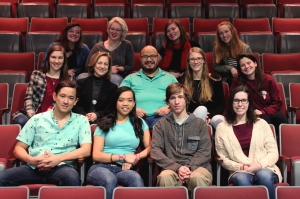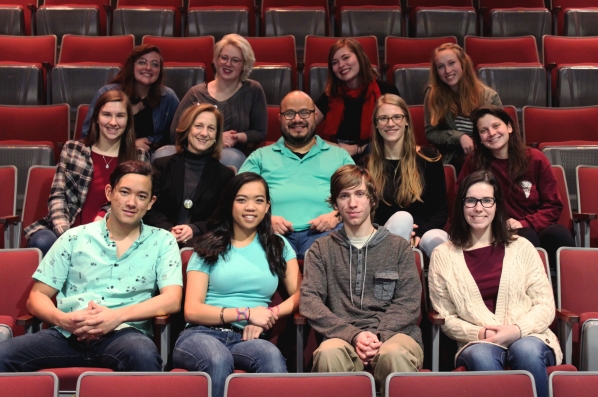By Anna Rhodes
Playwright Ramón Esquivel joined Appalachian State University Theatre and Dance students in February to help develop ideas for the world premiere of his newest play, “The Hero Twins: Blood Race.” The story, based on Mayan myths, brings many ideas of equality and worth to the stage in a compelling and entertaining manner. Esquivel’s name might sound familiar to some in the High Country, as Appalachian Young People’s Theatre (AYPT) toured his play “Luna” to area schools and performed the show on campus in 2013. Throughout his career, Esquivel’s plays have earned numerous awards and recognitions within the field of Theatre for Young Audiences (TYA). He enjoys writing plays for young audiences that inspire empathy, connection and belonging. While in residency at Appalachian, Esquivel graciously answered questions and expressed delight in seeing this project come to fruition.
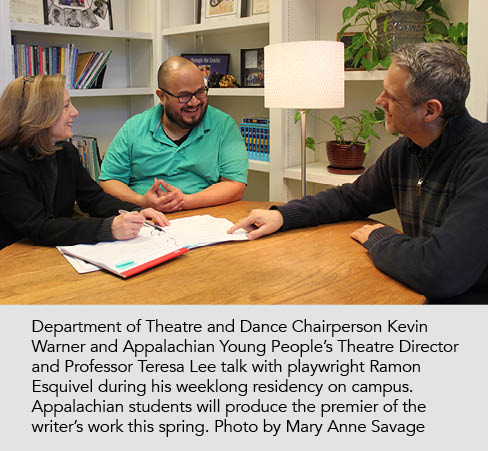
What inspired you to become a writer?
Esquivel: I’d been writing since I was a little kid. I had this desk in our family living room and I’d put a little sign on the desk that said “Bub’s Studio.” I claimed that desk because that’s where I was going to write my stories. I wrote throughout my childhood, but stopped writing in high school because I became busy with schoolwork. In college, I took one course on writing comedy. It was really fun, but I stopped writing again after that. I would occasionally write a short story here or there, but it wasn’t until I went to graduate school, where I took playwriting, that I truly fell in love. After teaching for a while, I decided I wanted to pursue writing even more, so I earned my MFA this summer to write fulltime and teach playwriting as well.
How do you feel that a live performance of “The Hero Twins” will impact audiences?
Esquivel: Theatre is designed to be experienced more than read. There’s something about an audience experiencing a story together, laughing together and potentially crying together, that bonds them. I read a study recently that found theatre audiences’ heart rates start to sync with each other while they’re watching a play. Audiences are literally connecting on a psychological level and that’s sacred. I hope “The Hero Twins” will be able to do just that as well as spark intelligent questions about our current world.
What did you enjoy most about working with the students and faculty at Appalachian?
Esquivel: There are a number of similarities between Appalachian State University and Central Washington University, where I teach. Both are strong regional universities with excellent theatre programs. I love seeing what the similarities are between two different regions, while also meeting a completely different group of people. It’s fun to go into classes to answer questions and talk about my experiences. Even though I’ve had a different experience because of where I lived, the choices that I’ve made and who I am, I think it’s great when students can say, “Oh! I can take that and apply it to my life and career choices.”
For me, I also love that I can’t rely on my reputation or previous relationships when working with students here. It forces me to improve the way that I’m articulating my ideas to different crowds and people from different backgrounds. Playwriting students want to know something different than elementary education students and so on, but I feel I have something to share with all of them. I love the intellectual challenge of speaking to different audiences and trying to help them. It’s also wonderful and rare that a university supports theatre for young audiences the way that Appalachian State does. Until you have been involved in theatre for young audiences it’s easy to dismiss it as “lesser theatre.” Once you’ve done it, you realize how high the standards are from young audiences. I hope Appalachian State continues to champion the cause. I know when this play goes on tour it will be the first play some of these students have seen. If the university is serious about serving the people of North Carolina and this region, you can’t do that by staying on campus and serving one audience. If you’re sending your student artists out into the world it’s a way for the university to say, “Hey, we’re here for everybody.” I’ve enjoyed seeing this aspect of the college during my stay here.
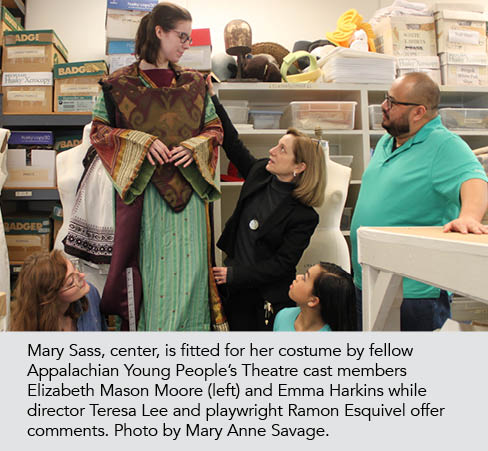
What are you most looking forward to with the premiere production of “The Hero Twins?”
Esquivel: The version of the play that is being produced here at Appalachian State is a touring version, so it’s a bit shorter and simpler than the full-length show. Clearly the set needs to fit in a van to move locations, so it’s been neat to see how creative the team here is with the story. What do you do when you can’t build an ice cavern? How do you suggest it? You can use fabrics, you use movement, you can use pantomime… all of these old theatre techniques. What you’re essentially doing is putting the “work” on the audiences’ part. You’re making them use their imagination to believe they’re in an ice cavern or a fire cavern. I believe that’s what makes true theatre. You suggest something as a playwright seen through by a producer, and the audience is required to fill in the rest using their imagination. I’m excited to see how the team is taking what I pictured as a grand, large-scale production in its fullness and stripping it down to its bare elements using theatrical magic to convey the same sense of wonder.
Why children’s theatre?
Esquivel: I’ve been a teacher for quite some time and I’ve spent a good bit of that time in grade schools. I’ve read a lot of literature for those readers and I’ve developed a sensibility for that kind of storytelling. Growing up, I didn’t see a lot of theatre, television or films that reflected Latino characters like me, so a big reason is that I feel I have this voice now. I have this access to storytelling and I want to put characters on stage that I’ve never seen before. I want to allow children to see themselves reflected in the characters they see appearing on stage, which was not my experience as a child. There’s also something about making kids laugh that’s magical. When they laugh and they’re pointing at something on stage… the epiphany is when they turn to somebody to share that moment. I think the experience that encapsulates why I’m dedicated to this field in particular comes from my play, “Luna.” Part of developing the script involved going to an elementary school in this tiny town where the population consisted mostly of migrant farmers. “Luna” featured people of this background, and we performed the play in a small trailer attached to the school. We used minimalistic elements, a few hand props, no costumes… out of the students who saw it, some twenty-six or so, none had ever seen a play before. That was their first theatrical experience. I considered it an honor that it was one of my stories. If I can write stories and inspire that sense of wonder, awe and questioning, I feel it’s my contribution to the generations to come. Not only in theatre, but as a citizen of this world. Because of that, I will always write for young people.
What do you hope children and families will be able to take away from “The Hero Twins?”
Esquivel: Moth and her brother Cricket are twins, but they’re very different people. They both represent a different approach to challenges and adversity. For Moth, she’s had to develop a lot of intrinsic motivation. She has to find a lot of inspiration from within herself because she doesn’t get a lot of external praise. In this way, I believe it’s important to note that she’s a girl. She defies a lot of gender stereotypes. For example, she’s a stonecutter and she starts off being kind of rough and clumsy. Characteristics that are not often associated with girls. The stonecutting tools she uses were meant to be used by her brother, but she’s better at it and she embraced that within herself. I hope they see what motivates her is not glory. It’s not praise and it’s not riches. She’s motivated by a desire to save her family. She has her moments of doubt where she’s not sure that she’s going to make it, but she’s driven by this internal engine that says she has to do something. On the other hand, her brother Cricket is this wonderful athlete. Everyone praises him for being the best runner and jumper, so he’s used to external praise. Cricket breaks stereotypes in his own way as well. He seems confident, but he’s insecure and he doesn’t know how to talk about it. He can only be truly vulnerable with his sister. In the same way, he brings out Moth in ways that she can’t when she’s alone. Ultimately, what I hope young people learn from these two characters is the different responses they can have to challenge and adversity. I also hope they see the importance of leaning on other people. Nobody is perfect, but when Moth and Cricket work together they can accomplish far more than when they’re working on their own. I’m fascinated by the Mayan culture that inspired this story and I hope students will want to look up Mayan culture, but the appeal of the play is the universal messages within. What would you do to save your family and how do you overcome adversity?
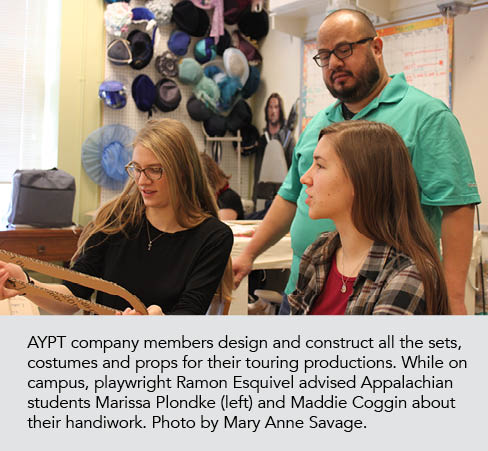
How does your Latino background define the way in which you write?
Esquivel: It has everything to do with how I write my plays. I’m probably not conscious of most of the ways it influences me. I have navigated this world as a brown man and when people see me they make assumptions. Those assumptions start to affect you no matter what. The reason I write plays partially stems from a desire to see people like myself on stage, but I also write stories with a universal appeal. The kinds of stories that I’m drawn to are about individuals who have to navigate a world that’s not fair, a world where people make assumptions and a world in which people might not make the best choices because they are trying to fit or defy a perception of themselves. Besides that, I know I’m drawn to literary styles associated with Latin America, such as magical realism. Honestly, I don’t know if I can completely and accurately articulate what specifically comes through in my writing, but those things are certainly part of it.
Do you promote social change through your writing?
Esquivel: Yes, absolutely. The playwright Edward Albee once said (and I’m paraphrasing here) but he said there is absolutely no reason to write, absolutely no reason for you to waste your time or anyone else’s time with your writing, unless you’re trying to change the world. I believe that’s important. When I first began, what I was trying to do was simple. I wanted to see characters like me and my family on stage. I wanted to change the theatre landscape by including more characters of color. Now as I’ve become more successful and gained some access and power for myself, I’m realizing that I have the ability to open doors for other people too. In that vein, I’m constantly on the lookout for other writers of color so I can highlight and promote their work. If I have navigated the many obstacles put in the way of people of color trying to be writers, if I got here and did nothing for anyone else, it would be a waste. It would be selfish and there would be no point to it. My viewpoint is that I’ve gotten where I am so that I can push away some of those obstacles for the people coming after me. That way they can go even farther than I have. I write these ideas into my plays as well. In “The Hero Twins,” I wanted to create a story that would encourage young people to ask questions about inequality in today’s society. Why do some people have more than others? It’s difficult to talk about in real life, especially when they’re talking about themselves. A shared story gives students a way to talk about these questions in a slightly removed way. You can talk about these issues in the context of “The Hero Twins,” which becomes a gateway to talking about it in relation to our own society. I’ve recently been included in an anthology coming out soon that’s all about Latino and Latina writers. It’s the first of its kind, and I’m really proud to be part of it. People of color have been writing in this field for a long time, but there are certain markers that show something has arrived. For there to be an anthology like this… it shows young people these plays exist. These people are here and they’re doing things. They’re good plays and I’m really excited about it.
Do you have anything in the works?
Esquivel: I have a new play called “Above, Between, Below” and it’s about bullying. It takes a new approach and shows how kids can shuffle between the levels of being bullied, participating in it and being a spectator of it all at the same time. Besides that, lately I’ve gotten into writing plays featuring characters in their twenties. I finally feel distanced enough from that stage in my life to write about it with some wisdom. I’ve recognized there are not a lot of roles out there for people fresh out of college and graduate school. People who have real skills, but often have to wait ten or more years before they get these good, meaty roles. I’m really interested and am working on creating a body of work featuring characters in their twenties. That way, they can start putting their talents to use with some inspiring and complex characters. I view it as an extension of my work for theatre for young audiences. I’m constantly increasing that range.
What advice do you have for aspiring writers?
Esquivel: Do it. Understand that it’s a long process, but do it. I’m never happy with my first drafts. I made tremendous leaps as a writer when I embraced the revision process. If you embrace the revision process a lot of the stress of writing starts to go away. You stop feeling if you don’t get it right the first time it must be a bad idea. It’s important to stay involved in life. Go to school, read, go to your job, stay connected with friends, meet new people… The best plays are about life. If they’re fantasies or science fiction or mythology, you’re trying to speak to your contemporary audience in a way that’s going to bring change. But you can only keep tabs on what needs to change if you’re in the world.
About the Production
Performances of “The Hero Twins: Blood Race” are scheduled for 7 p.m. April 6–8 in the I. G. Greer theatre located on 401 Academy Street on Appalachian campus. The front entrance of I. G. Greer faces the side of Sanford Hall also located on 401 Academy Street. Parking is available after 5 P.M. on campus in faculty/staff lots and after 5:30 P.M. in the College Street parking deck near Belk Library and Information Commons. Tickets are $5 for students and $10 for adults. For information on purchasing tickets call the Schaefer Center box office toll free at (800) 841-2787, locally at (828) 262-4046, visit the box office in person, or go online at theschaefercenter.org/tickets.
About the Department of Theatre and Dance
The Department of Theatre and Dance is one of seven departments housed in Appalachian’s College of Fine and Applied Arts. Its mission is to facilitate transformative experiences for students and the public, which cultivate compassionate, creative and collaborative communities through theatre and dance. The department also offers coursework for integrated learning through the arts to the general university student population. Its dynamic co-curricular production program provides exemplary theatre and dance experiences to departmental students, the university community and the region.
About Appalachian
Appalachian State University, in North Carolina’s Blue Ridge Mountains, prepares students to lead purposeful lives as global citizens who understand and engage their responsibilities in creating a sustainable future for all. The transformational Appalachian experience promotes a spirit of inclusion that brings people together in inspiring ways to acquire and create knowledge, to grow holistically, to act with passion and determination, and embrace diversity and difference. As one of 17 campuses in the University of North Carolina system, Appalachian enrolls about 19,000 students, has a low student-to-faculty ratio and offers more than 150 undergraduate and graduate majors.
###
Media Contact
Keith Martin
martink1@appstate.edu
